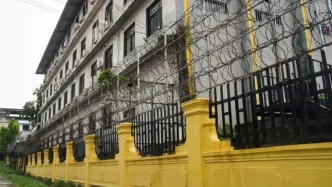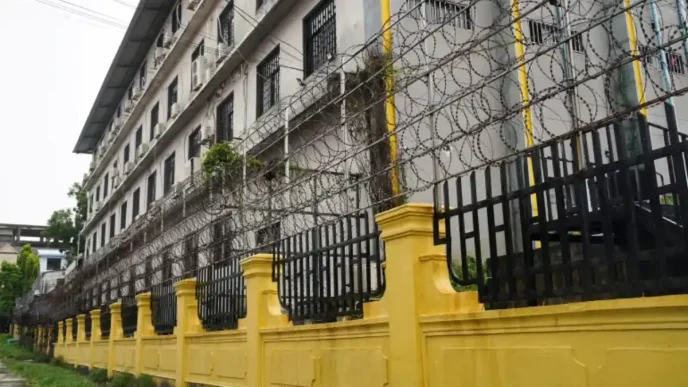The Philippine government has vowed to investigate claims that individuals suspected of being Chinese spies donated motorcycles and cash to the Philippine National Police (PNP) and local officials in Tarlac City. The allegations, first reported by Reuters, have raised concerns about foreign influence and potential espionage within the country’s law enforcement and local governance structures.
Presidential Communications Office Undersecretary and Palace Press Officer Atty. Claire Castro announced on Monday that the Palace would examine the circumstances surrounding the donations. “As of now, we will study that. If this was a donation in good faith, we really need to know because receiving a donation is not a bad thing,” she said during a Palace briefing, speaking in a mix of English and Filipino. However, she added a note of caution: “If this was given with an ulterior motive, we need to investigate it.”
The controversy stems from a Reuters exclusive published on 28 February 2025, which detailed donations made in 2022 by four individuals—Wang Yongyi, Wu Junren, Cai Shaohuang, and Chen Haitao—through Chinese-backed groups. The report claimed that Wang, Wu, and Cai donated 10 Chinese-made motorcycles, each valued at approximately $2,500 (P144,800), to the Manila police. Additionally, Wang was reportedly seen in a social media post by Shandong ACFROC in July 2022, handing over a cheque worth P500,000, labelled as a “poverty alleviation bursary,” to the mayor of Tarlac City.
These revelations have sparked unease in Manila, with questions arising over whether such contributions could compromise national security or influence local governance. Castro emphasised the need to identify any local government officials involved in receiving these donations, particularly to determine if they were unwittingly used as conduits for foreign agendas. “We should also identify the local government officials who received it to ensure that this does not happen again, especially if they were being used without their knowledge,” she noted.
PNP Launches Internal Inquiry
The Philippine National Police has already initiated an investigation into the matter. PNP-Crime Investigation and Detection Group chief Brig. Gen. Nicolas Torre III confirmed that an inquiry was underway, following direct orders from the PNP chief. “I believe that the PNP chief has already ordered an inquiry on that matter to determine the root cause and exact circumstances of the donations,” Torre stated during the Saturday News Forum in Quezon City on 4 March 2025.
The investigation will likely scrutinise not only the intent behind the donations but also the broader implications for police integrity and independence. The PNP, as a key institution in maintaining law and order, has faced previous criticism over issues of corruption and external influence. If confirmed, these allegations could further erode public trust in the force, particularly at a time when the Philippines is navigating complex geopolitical tensions in the South China Sea.
Geopolitical Context and Speculative Concerns
The timing of these allegations is significant, as the Philippines continues to grapple with its relationship with China amid territorial disputes in the West Philippine Sea. President Ferdinand Marcos Jr. has previously expressed alarm over the presence of alleged Chinese spies in strategic areas such as Palawan, a province critical to the country’s maritime defence posture. In a statement reported by local media, Marcos described himself as “very disturbed” by such developments, underscoring the government’s heightened sensitivity to potential espionage activities.
While no concrete evidence has yet emerged to confirm that the donations were part of a deliberate espionage effort, the possibility has fuelled speculation among analysts. If proven, such actions could represent a subtle form of influence peddling, aimed at securing goodwill or access within key institutions like the PNP or local governments. However, without verified information, these remain speculative concerns, and officials have been careful to avoid drawing premature conclusions.
The Palace’s response, as articulated by Castro, reflects a balanced approach—acknowledging the potential legitimacy of donations made in good faith while recognising the need for vigilance against ulterior motives. This cautious stance aligns with the Philippines’ broader foreign policy, which seeks to maintain diplomatic ties with China while safeguarding national sovereignty.
Local and International Reactions
Public sentiment in the Philippines appears divided over the issue. While some citizens view the donations as a pragmatic gesture of support for underfunded police forces, others express unease over the potential strings attached. Social media platforms have seen a flurry of opinions, with some users questioning why foreign entities are involved in funding local law enforcement at all.
Internationally, the allegations have drawn attention due to their implications for regional security dynamics. The South China Sea remains a flashpoint for tensions between China and several Southeast Asian nations, including the Philippines. Any suggestion of covert influence by Chinese entities in the region is likely to be closely monitored by neighbouring countries and global powers such as the United States, which maintains a strong military alliance with Manila.
Broader Implications for Governance
Beyond the immediate controversy, the incident raises critical questions about transparency and accountability in the acceptance of foreign donations by public institutions. In many countries, including the Philippines, budgetary constraints often lead local governments and agencies to seek external funding for equipment or community projects. However, the lack of stringent oversight mechanisms can create vulnerabilities, potentially allowing foreign actors to exploit goodwill for strategic gain.
If reforms were to be introduced to address these gaps—such as mandatory disclosure of all foreign donations to public entities—they might reduce the risk of undue influence. Yet, such measures would require robust implementation and political will, neither of which can be guaranteed in a system already strained by bureaucratic inefficiencies. It remains to be seen whether the current investigation will prompt broader policy changes or if it will be confined to addressing this specific case.
Historical Precedents and Regional Parallels
This is not the first time the Philippines has faced allegations of foreign interference through financial contributions. Past incidents involving Chinese investments in infrastructure projects under the Belt and Road Initiative have similarly sparked debates over national security and economic dependency. While those cases often involved state-to-state agreements, the current allegations point to a more direct form of engagement at the local level, potentially bypassing national oversight.
Regionally, other Southeast Asian nations have encountered similar challenges. In Malaysia, for instance, concerns over Chinese-funded projects have led to public and political pushback, with fears that economic ties could translate into political leverage. In Cambodia, meanwhile, close ties with Beijing have raised questions about the extent of Chinese influence over domestic policies. The Philippine case, if substantiated, could add to a growing narrative of concern over China’s soft power strategies in the region.
Looking Ahead
As the Palace and PNP investigations unfold, the outcomes will likely have far-reaching consequences for both domestic governance and foreign relations. A thorough and transparent inquiry could help restore public confidence and set a precedent for handling similar cases in the future. Conversely, a lack of clarity or accountability might deepen mistrust in institutions already under scrutiny.
For now, the government’s commitment to investigating the donations offers a glimmer of reassurance. Yet, the broader geopolitical stakes—coupled with the speculative nature of the espionage claims—mean that this story is far from over. As Castro herself noted, the distinction between a gesture of goodwill and a calculated move with hidden motives is critical, and uncovering that truth will be no small task.
The Philippine public, as well as regional and international observers, will be watching closely to see how Manila navigates this delicate balance. With national security, institutional integrity, and diplomatic relations all at play, the resolution of this issue could serve as a litmus test for the country’s ability to safeguard its sovereignty in an increasingly complex geopolitical landscape.














